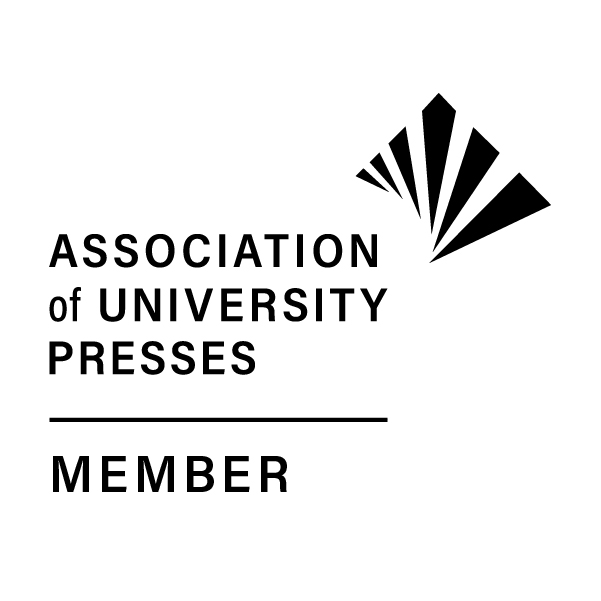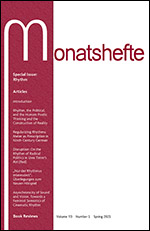|


|

Subscribe
Read the Journal Online
Submission Guidelines
Editorial Board
Receive Email Updates
Advertise in Monatshefte
Indexes/Abstracts
Current Issue TOC
Back Issues TOC
Monatshefte 2022 Subscription Rates
Institutions:
print & online $271
online only $233
Individuals:
print & online $103
online only $86
Non U.S. Postage (no postage charges for online-only subscriptions)
Airmail: add $40/yr.
Canadian Subscribers: add 5% GST. |
Monatshefte
Volume 111, Number 1, Spring 2019
Table of Contents
ARTICLES
Frank Trommler
Austria Past, Austria Present: Stages of Scholarship in the American University
Though focused on Austrian Studies, the essay illuminates a broader question: how Austria fared as a topic of study in the American academy until today. It follows the stages of scholarly analysis since the 1960s that have been set by the disciplines of History and German, thus predetermining what has been called a two-pronged approach: Austrian Studies in the fields of history and political science (with the reference to Central Europe at the center), and Austrian Studies as exploration of the cultural, literary and linguistic features of the country (with constant negotiations of Austrian independence from German culture). American historians were leading in the revision of the self-created concept of a past without Nazism. Austrian-Jewish refugee Germanists knew much about the Nazi past but applied their energies to de-provincializing American Germanistik and reforming the canon with authors like Kafka, Musil, Kraus, and Broch, As the “Waldheim Affair” in 1986/7 overshadowed the happy indulgence with Vienna 1900, American scholars have developed a critical appreciation, in which Habsburg’s multiculturalism attracts new attention. (FT)
Andrea Speltz
How to Read: Lessons from Christoph Martin Wieland’s Shandean Turn in Der neue Amadis
This article situates Wieland’s Der Neue Amadis within the history of reading pedagogy in Germany. It begins by arguing that Laurence Sterne’s Tristram Shandy furnishes Wieland with the narrative techniques for advancing critical reading practices. It proceeds with a brief outline of the major developments in eighteenth-century reading pedagogy, which culminate in the use of imaginative literature as a means to develop various mental faculties. Lastly, it formulates the pedagogical goals of Der Neue Amadis and compares them to other reading methodologies of the time. The main argument is that reading Der Neue Amadis with an eye for its pedagogical goals gives us a clearer picture of how imaginative literature could be seen to promote the goal of enlightenment. (AS)
Rolf J. Goebel
Hölderlins Erinnerungsmusik
In Friedrich Hölderlin’s letters and poetry, the fragility and evanescence of music frequently functions both as an aesthetic object and as a metaphoric medium of a self-reflexive tension between memory and forgetting. Inspired by the classical Orpheus myth, Hölderlin’s musical imagery expresses the human subject’s melancholic quest for the re-presentation of a lost object of desire that irrevocably slips away into an idealized past. But for all their mournfulness and despair, the musical references also evoke the poet’s hope for a redemptive harmony even if his writings question whether this vision is realizable in the future. (RG; in German)
Benjamin Brand
„[D]ie größte Weisheit verrathet sich . . . “ Johann Peter Hebels Anleitungen zum Selbermerken
This article is a close reading of the opening paragraphs of Johann Peter Hebel’s early calendar piece Über die Verbreitung der Pflanzen (On the Dissemination of Plants), which draws upon thematically and intertextually related passages from his œuvre and from Martin Luther’s translation of the Bible. It outlines Hebel’s conceptualization of humankind’s role within and relation to creation as a ‘whole,’ demonstrating how the actualization of that role is not predetermined, but is contingent upon a person’s ability to perceive what appears self-evident or simple in nature as wondrous and manifold. In this context, Hebel’s language plays a crucial role in that, rather than acting prescriptively, it constitutes a performative approach which allows the inclined reader to notice [merken] on his or her own account—that is, to take note that nothing is yet understood. (BB)
Erica Weitzman
“Ich, von dem du ausgingst?” Inheritance and Anamorphosis between Freytag and Kafka
This article reads Kafka’s 1912 short story “Das Urteil” against—and potentially, as a response to—Gustav Freytag’s bestselling saga of German mercantilism and middle-class advancement, the 1855 novel Soll und Haben. Placing these two texts in juxtaposition to one another (and in contrast to related intertexts by James Joyce and Max Brod) in the context of Kafka’s well-known practices of pastiche, the article shows how Kafka’s story structurally inverts particular aspects of Freytag’s novel, upsetting the expectations and roles that Freytag’s popular bourgeois Bildungsroman assumes or tendentiously seeks to naturalize. Kafka’s story thus not only intervenes in the infamously racialized (not to say racist) hierarchies of Soll und Haben’s universe, but also destabilizes the identificatory, edifying, and inculcating practices of reading that Freytag’s novel, as a paradigmatic text of German realism, implicitly demands. (EW)
Christiane Steckenbiller
Berlin’s Colonial Legacies and New Minority Histories: The Case of the Humboldt Forum and Colonial Street Names in the German Capital
This essay interrogates how temporary and permanent urban structures highlight, question, and challenge Berlin’s urban identity. Specifically, I argue that the city center offers a unique opportunity to make visible histories that are traditionally excluded in the master narrative of contemporary Germany centered around Vergangenheitsbewältigung and German reunification. In looking at the Prussian City Palace and the remnants of colonial street names, I examine how a coming to terms with colonial history might be able to increase the visibility of other marginalized and/or minority histories and communities, and strengthen the ties between them. Often it is because of the creative and long-term efforts of rigorous grassroots activism that the public is forced to confront such histories in the public space. Therefore I focus on local and regional organizations to highlight how such groups form translocal and transcultural alliances, and challenge uneven power relations in the urban landscape. (CS)
REVIEW ARTICLE
Helga G. Braunbeck
Recent German Ecocriticism in Interdisciplinary Context
(Schmitt, Claudia und Christiane Solte-Gresser, Hrsg., Literatur und Ökologie. Neue literatur- und kulturwissenschaftliche Perspektiven, 2017. – Grimm, Sieglinde und Berbeli Wanning, Hrsg., Kulturökologie und Literaturdidaktik. Beiträge zur ökologischen Herausforderung in Literatur und Unterricht, 2016. – Zemanek, Evi, Hrsg., Ökologische Genres. Naturästhetik – Umweltethik – Wissenspoetik, 2018. – Dürbeck, Gabriele, Urte Stobbe, Hubert Zapf, and Evi Zemanek, eds., Ecological Thought in German Literature and Culture, 2018. – Schaumann, Caroline and Heather I. Sullivan, eds., German Ecocriticism in the Anthropocene, 2017. – Wilke, Sabine and Japhet Johnstone, eds., Readings in the Anthropocene: The Environmental Humanities, German Studies, and Beyond, 2017. – Heidenreich, Sybille, Das Ökologische Auge: Landschaftsmalerei im Spiegel nachhaltiger Entwicklung, 2018.)
BOOK REVIEWS
Benne, Christian und Claus Zittel, Nietzsche und die Lyrik. Ein Kompendium (Hannah V. Eldridge)
Crew, David F., Bodies and Ruins: Imagining the Bombing of Germany, 1945 to the Present (Christoph Weber)
Dirscherl, Margit, Heinrich Heines Poetik der Stadt (Erhard Schütz)
Egyptien, Jürgen, Stefan George. Dichter und Prophet (Rolf J. Goebel)
Evans, Jennifer, Paul Betts, and Stefan-Ludwig Hoffmann, eds., The Ethics of Seeing: Photography and Twentieth-Century German History (Justin Court)
Fohrmann, Jürgen, Hrsg., Chronik/Gefühle. Sieben Beiträge zu Alexander Kluge (Hunter Bivens)
Gordon, Peter E., Adorno and Existence (Markus Weidler)
Gray, Richard T., Ghostwriting: W.G. Sebald’s Poetics of History (Alan Itkin)
Hohendahl, Peter Uwe und Ulrike Vedder, Hrsg., Herausforderungen des Realismus. Theodor Fontanes Gesellschaftsromane (Christiane Arndt)
Kontje, Todd, Imperial Fictions: German Literature Before and Beyond the Nation-State (Katherine Arens)
Krylova, Katya, The Long Shadow of the Past: Contemporary Austrian Literature, Film, and Culture (Jack Davis)
Nübel, Birgit und Norbert Christian Wolf, Hrsg., Robert Musil Handbuch (Brett Martz)
Öhlschläger, Claudia und Michael Niehaus, Hrsg., W.G. Sebald-Handbuch. Leben—Werk—Wirkung (Helen Finch)
Schlosser, Horst Dieter, Die Macht der Worte. Ideologien und Sprache im 19. Jahrhundert (Jost Hermand)
Telge, Claus, „Brüderliche Egoisten“. Die Gedichtübersetzungen aus dem Spanischen von Erich Arendt und Hans Magnus Enzensberge (Thomas Fuhr)
Utz, Peter, „Nachreife des fremden Wortes“. Hölderlins „Hälfte des Lebens“ und die Poetik des Übersetzens (Jan Mieszkowski)
Zapf, Hubert, ed., Handbook of Ecocriticism and Cultural Ecology (Caroline Schaumann)
|

